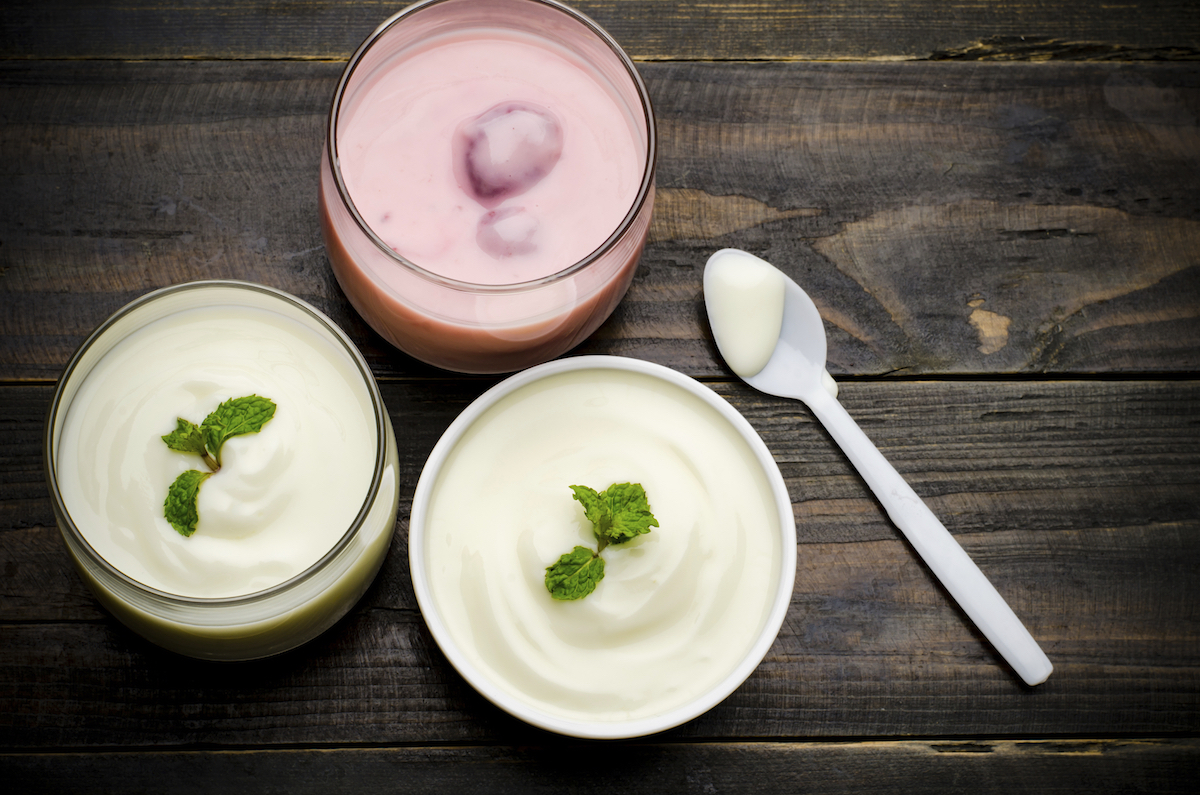We are what we eat, right? This might be more true than we think. Dr. Emeran Mayer, a gastroenterologist, professor at UCLA, and author of The Mind-Gut Connection, recently joined Dawn Ludwig, chef and former director of The Natural Epicurean Academy of Culinary Arts in Austin, TX, to talk about the interplay between what we eat and how we feel.
Dawn Ludwig: There’s so much talk about mindfulness, and so much talk about the gut microbiome, and what’s fascinating is you seem to have merged these two.
Emerson Mayer: I should preface, I’m not a nutritionist. I’m certainly not proposing the healthiest diet. But one of the things that has always intrigued me is the synthesis of an Eastern worldview and spirituality with modern medicine. Two things follow me throughout my career: one of them is bringing the brain back into medicine, and the other one is merging east and west. And it’s rewarding now to see that this can actually happen. My book is the synthesis of multiple dimensions from the spiritual to the nutritional to the neuroscience and gastroenterology.
Dawn: It’s something that David [Ludwig] and I have done in the book, Always Hungry. I come more from the Eastern side and from the cooking side, whereas he is a Western medical doctor, an endocrinologist, and merging those two is fascinating, and I hope that we’ll continue to see more of it because I think it’s important. We’ve talked so long about what we think affects us, but what you’re saying is it actually affects the bacteria in our body. Is that right?
Emeran: Yes, and I would say that’s probably the most revolutionary concept. We’ve always known the mechanism from which the brain can diagnose to the gut and change its contractions, secretions, etc. I mean this is not that novel. During the stress response, the brain basically changes the entire performance of our digestive system. We also know now that any emotion really has a mirror image in our gut function. That’s an important part, but I would say that the most exciting part of this is that the same signals that can spill over in the gut — the neurotransmitter or the stress hormone, norepinephrine — can act on these microbes and change their gene expression, influencing the way that they interact with our gut. We have a direct link between the brain, a response, an emotional stress induced, that then affects not just the gut, but also the microbes in it. Which is kind of hard to believe.
Dawn: It’s like magic.
Emeran: It is like magic. It also does explain a lot of things — more than people believe. What I found is that a lot of people are simply focused on the adjusted part, on the nutrition, if it’s high-fat or low-fat, high sugar, whatever. That’s important, but it’s one part of it. What people don’t think about as much is how what they put into that system interacts with the microbes. That’s ultimately what determines how food is affecting us.
Dawn: In the 20 years that I’ve been a natural food chef, we’ve talked a lot about this: not just what you eat, but how you eat. Are you sitting down? Are you being mindful? We all know that when we’re stressed, we either eat too much or we don’t eat. There have been scientific studies that if you’re watching TV, you’re not paying attention to what’s going in your body. You’re saying that it’s more than just not paying attention, it’s actually changing your gut microbiome.
Trending: Best Happiness Books of 2025 (So Far)
Emeran: It is directly. It’s the direct communication loop to the microbes, and that whole universe. They’re not existing in isolation. And there are literally trillions of them. If you think about a country with small towns and cities, that’s really how we have to think about our gut microbiome. They don’t just fill up the length of our gut, they have these communities in different parts, and different emotions and different stress signals affect those differently. It’s not one way that everything is being affected.
It’s become obvious to me, looking at the publications about the health benefits, for example, of the Mediterranean diet, a lot of the authors write that the macro nutrients and the antioxidants are one part of it — but a big part is the social interaction which form the context in which these meals are eaten. I’ve experienced this myself in multiple variations. Compare a lengthy Italian dinner with friends to sitting and munching food during a one-hour lecture. In the meeting, we have no idea what we’ve eaten. It’s quite different.
Dawn: It sounds like there are two sides to this. One is getting the right microbiome, so getting the right microbiotic in your body that’s going to absorb your food well, and creating an environment that is conducive for them to live. Then the second is the mindfulness environment. What’s the perfect petri dish for them, and what is the perfect emotional petri dish, and how do they interact with each other?
Serotonin is this molecule that plays a role in our well being, appetite, sleep, and has a role in depression if you’re deficient in it. 98% of that serotonin is stored in our gut.
Emeran: To understand this interaction between the food that we eat, the probiotics that we consume, the microbes and their behavior, and what effect this has on our emotional state and our well being — a very good example focuses on one cell type that’s located in the gut wall. It’s the so-called serotonin-containing cells. Serotonin is this molecule that plays a role in our well being, appetite, sleep, and has a role in depression if you’re deficient in it. 98% of that serotonin is stored in our gut.
That’s interesting by itself, but what makes it more intriguing is that on their surface, these serotonin-containing cells have receptors for molecules such as short-chain fatty acids that the microbes produce when they metabolize or digest complex carbohydrates from vegetables or fiber products. These substances act on the serotonin cells, stimulate their synthesis and their release, and then the serotonin signals are transmitted directly into the brain to our emotional centers within the brain.
Now we add the food to it, so we have the high amount of either probiotics or fiber products that influence the short-chain fatty acid production, and that in turn stimulates the serotonin biology. That signals back to our brain, and our brain itself also has a way to regulate the production and release of serotonin. It’s like an integrated circuit that includes what we eat, how we feel, and what the microbes do in our gut as a mediator of those various influences.
Dawn: Do you think that they have different receptors, or that they receive things differently based on what you eat as well? Like, if you eat a complex carb versus a highly refined carb, are those going to affect those receptors differently?
Emeran: Yes, because the highly refined carb, you know, most of that will be absorbed in the small intestine. Whereas the complex carbs, they basically can be broken down less. One of the main reasons that humans in evolution developed cooking foods was because they would break down partially these carbohydrates, and the ones that still are not broken down into components that our small intestine can absorb make it into the colon and feed on the food and the nutrients for the colonic microbiome. There’s not too many studies yet, unfortunately, where you could say if you’re on a diet really rich in complex carbohydrates, as opposed to somebody who eats the same amount of calories in the form of solvent sugars, what effect does this have on your mind, on your state of well being?
Some people feel this intuitively. They feel lousy after eating a lot of sweets, but feel good and satiated when they eat a meal high in complex carbohydrates. But at this point there are no good scientific studies to show, for example, that your brain responds differently.
Dawn: It’s almost like a mirror of the addiction centers that light in the brain. I know that David has done some studies where they showed when you ate simple carbohydrates, the addiction centers in the brain lit up. It would be great if we had studies that would show how they also affected the microbiome.
Emeran: There are many things we could hypothesize, a lot of room for speculation, but what I like about the state of the science right now is the basics are laid out of what is possible. You never have to say, this is psychological or it’s only related to food. You have some of the basic circuits already in place. We’ll need to have studies, of course. But it could easily be that major dietary manipulations could play a role in changing addictive behavior, not as a solo therapy, but as an add-on therapy.
Dawn: I agree, and actually we’ve seen this. Before we published the book, we did a pilot study to see how people responded when they were eating higher fat, lower carb diets. Actually, we didn’t do completely low carb. We changed what types of carbs you ate — getting carbs from fiber-complex carbohydrates rather than simple carbohydrates, and a good amount of proteins. We’ve seen both in the pilot study, and from over 5000 members in our Facebook community, people across the board saying, “I’m feeling better. I am happier. I am able to say no in ways that I wasn’t before.” The way David describes it is that your fat cells are absorbing all of your calories, and your body is starving, so you’re always hungry. It sounds like a perfect synergy here, they’re starving their microbes which is making them hungry even more. Simply switching what they’re eating is changing the way they feel. About seven women in the pilot study even got off depression meds.
Now we have 100 trillion microbes sitting there and not being able to do their job of carbohydrate digestion.
Emeran: This concept of starving your microbes with the modern North American diet is definitely interesting. There’s the high proportion of simple carbohydrates, another is the absence of fermented fruits that most other cultures have. There’s many things there. Also the high amount of animal-based fats, many of which are absorbed in the small intestine, so you get your calories before the microbes. You get an excess of calories, while at the same time you starve your microbes of what they really want. The reason why they have evolved in the first place is to break down these complex carbohydrates. Now we have 100 trillion microbes sitting there and not being able to do their job of carbohydrate digestion.
Dawn: Are there certain types of fermented foods or probiotics that you recommend? When I went to culinary school, I taught a whole series on fermented foods. They’ve been so important in traditional societies. Is it important to get a wide range of those, or are their certain probiotics that target parts of the microbiota?
Trending: Why Rest is the Biggest Productivity Hack for Your Brain
Emeran: My opinion on this is that we don’t have enough evidence to really make these specific recommendations. You know, is probiotic A better than probiotic B? Or are probiotics occurring in natural food better than the ones that are in pill form or in dairy product form? We just don’t have the science ready. I’ve seen several works of companies that make fermented products, and these are very serious companies, but the scientific answer is not out.
I would say, there are a couple of things to remember. One: the benefit is only there as long as you adjust the probiotic, whatever its source is. There’s no change in your microbiome that outlasts the intakes of the probiotics. So you have to take these probiotics as long as you want the benefits.
Two: the composition of the microbes, per se, doesn’t change that much if you take the single probiotic. It’s the metabolites that they produce that does change. We’ve done this first study where we ask healthy women to ingest a probiotic-enriched yogurt for four weeks. We found there was no change in the micro-gut microbial composition. There was a change in the metabolites that they produced. There was a detectable change in the brain in response to a particular emotional task. So there’s clearly an effect that you can measure, not just locally in the gut, but also distant sites like the brain.
You would say intuitively — and that’s what’s often said in scientific meetings and discussions — eating multiple probiotics is better than a single one, just to increase the diversity of microbial environment. It varies on what the beginning situation is. Are you an individual with a compromised diversity of microbes, and would you then benefit more than somebody who has a highly diverse microbiome? Are you young? Are you a one-year-old infant or are you a 70-year-old elderly person? All of these factors, I think, ultimately will determine the benefit. It’s a difficult answer scientifically. My recommendation to patients is always increase the fermented foods in your diet in general, and in addition, if you find a supplement that contains multiple probiotics, or if you got benefit from a particular probiotic in a dairy product, then you should stick with that as well.
Dawn: Does it matter what time of day you eat fermented foods and probiotics?
Emeran: There’s a recent study that has shown this intricate link with diurnal rhythm of the microbial behavior. Clearly, the microbes do different things during sleep, when your digestive system is empty, than they do during day time. But we don’t know the answer. If you eat a probiotic in the morning, is that better than if you eat it in the evening? Many cultures, as you know, all the way down from Turkey to India, they ingest a substantial amount of yogurt as part of their diet. Some think there must be some wisdom to that if it’s persisted over thousands of years, but we don’t know scientifically. It’s quite possible.
I do want to emphasize, it’s really about the regular intake of this. There’s always the story about Elie Metchnikoff, the person that’s promoted the health benefits, and it’s based on his personal experience of ingesting lactobacillin and different bacteria. He ate enormous amounts of yogurt, but when he stopped, it would always switch back to its basic state. It’s something you have to do on a regular basis, pretty lifelong, I would imagine.
Trending: How to Break Free From the Ambition Trap
Dawn: Something that you said in one of the videos on your website was that you have a constitutional makeup and then you have a condition that you create over time. I thought it was interesting, you referred to the gut microbiome that you’re born with. Are you able to change and adapt that, or do you just feed it different ways to make it more effective?
Emeran: This is a topic that’s been a little bit controversial. In general now, what people believe is that your microbiome, the basic structure, is programmed early in life. Multiple influences are going through the birth canal and being seeded by vaginal bacteria from the mother. Then ingesting human breast milk, the influence of living in a family, the intimate contact with other family members. All of this contributes in the first two or three years of your life to program your personal microbiome. In addition, a big factor are your own genes, which have a close interaction with environmental factors in determining what microbes settle in different parts of your GI tract.
…diet per se will not completely change the constitution of your microbiome. It will modify it, but when you switch back to another diet, it will revert back to the original.
It seems that other than, for example, the intake of antibiotics — in particular during this early formative phase — that diet per se will not completely change the constitution of your microbiome. It will modify it, but when you switch back to another diet, it will revert back to the original. It’s not going to cause any permanent reprogramming. Antibiotics are the one difference. Antibiotics have the demonstrated potential to permanently change the composition, primarily the diversity of your microbiome.
Dawn: It sounds like if there are many people in the world who didn’t get the perfect start for their gut microbiome, it’s going to be even more important to do as we were saying before, take that other route of feeding it well to change the way, the effectiveness of it, I should say.
Emeran: Absolutely. One example I looked into are people that have the most diverse gut microbiome, primitive hunter gatherers like the Yanomami Indians living on the Orinoco River. Their microbiome has been studied, and they have several fold larger diversity of their microbes than people living in North American cities, even during infancy. The unique thing about these people is that they eat a diet very high in complex carbohydrates, very high plant-based diets, small amounts of animal products, and almost no animal-based fat because the animals that they hunt, the fish and the birds and some larger animals, all have basically no fat content. When these people move into the city, like in Caracas, and are studied, they actually turn into similar low-diversity state of microbiome as people in North America, and become obese, and develop all the metabolic problems that the Westerners have.
There is certainly a benefit to starting out really well but when you then get into an environment that is starving your microbes, they can deteriorate. Of course the other direction is possible, and we saw that really clearly, that through diet we can increase diversity. I think one concept that people aren’t thinking about is to individualize the treatment. If you’re starting with a low diversity, you are probably somebody who would benefit more from the regular intake of probiotics than somebody who is starting out with the perfect microbiome in the beginning. A Yanomami Indian probably would not have to eat probiotics to further improve their microbiome.
Dawn: We’ve worked a lot with weight loss, of course, and one of the things that has been a traditional part of weight loss is this “I’m going to restrict and deprive and cleanse and repent for past poor eating and whip my body into shape” mentality. We’ve been trying to get people out of that mindset and into a mindset of “I need to nourish and love and strengthen and work with my body, and when I do that, I’ll feel better.” Then weight loss will be what we call a happy side effect. It sounds like that simple shift from a restrictive, deprivation mentality around weight loss and exercises to a love and nourish mentality could also affect the microbiome in really important ways.
Emeran: When you restrict yourself, you basically activate your stress response to the max. For example, during withdrawal in substance abuse, you have some of the major activation of your central stress systems. Molecules like the corticotropin-releasing factor that is secreted in your brain during stress and during withdrawal phases in substance abuse patients — the level goes sky high. That clearly has an effect on your microbes and on their behavior, and obviously, it must have a detrimental effect on your ability to lose weight because it doesn’t work. We know that this kind of a course just doesn’t work.



























